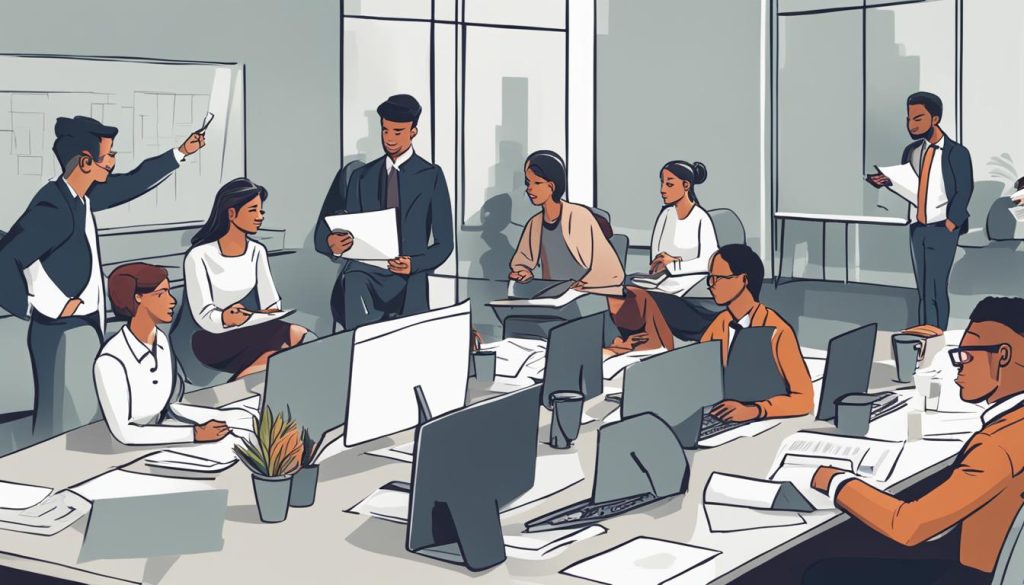As a professional, I understand the importance of being a good team player in the workplace. Effective collaboration skills and strong communication skills in teamwork are essential for achieving work goals and fostering a dynamic and productive workplace.
Being a good team player goes beyond individual contributions; it is about building trust, fostering a positive team culture, and working together towards shared objectives.
- Master effective collaboration skills
- Develop strong communication skills in teamwork
- Build trust among team members
- Foster a positive team culture
- Work towards shared objectives
The Characteristics of a Good Team Member
Being a good team member is essential for building trust in a team and fostering a positive team culture. Let’s explore the key characteristics that make someone a valuable asset to any team.
1. Accountability
A good team member takes responsibility for their actions and understands how their choices impact the team as a whole. They own up to their mistakes, learn from them, and actively seek solutions to rectify any issues that arise.
2. Flexibility
Flexibility is crucial in a dynamic work environment. A good team member embraces change and adapts quickly to new circumstances and challenges. They are open to different perspectives and ideas, demonstrating a willingness to explore new approaches.
3. Positivity
Maintaining a positive mental attitude is paramount in a team setting. A good team member brings enthusiasm, optimism, and constructive energy to the table. Their positive attitude helps uplift team morale and creates a supportive work atmosphere.
4. Commitment
Commitment goes beyond showing up to work on time. A good team member is dedicated to the team’s goals and is willing to invest the necessary time and effort to achieve them. They prioritize the team’s objectives and consistently work towards their fulfillment.
5. Integrity
A good team member upholds the team’s values and acts with integrity. They demonstrate honesty, trustworthiness, and ethical conduct in all their interactions. They hold themselves accountable to high standards and expect the same from others.
6. Supportive
A supportive team member understands the importance of collaboration. They actively encourage and assist their peers, fostering a sense of unity and cooperation within the team. They openly provide guidance and offer help when needed.
7. Upholding Team Values
A good team member recognizes the significance of upholding the team’s values. They advocate for these values and push back on any ideas or actions that go against them. They ensure that the team’s culture remains aligned with its core principles.
“Individual commitment to a group effort – that is what makes a team work, a company work, a society work, a civilization work.”
To sum it up, being a good team member involves possessing qualities such as accountability, flexibility, positivity, commitment, and integrity. By embodying these characteristics, individuals can contribute to building trust in a team and fostering a positive team culture.
Why Should You Learn to Be a Good Team Player?

Learning how to be a good team player is essential in today’s dynamic and collaborative work environments. Employers highly value effective collaboration skills, as they promote cooperation, support team goals, and drive success.
When you cultivate effective collaboration skills, you contribute to the overall productivity and efficiency of the team. By working together harmoniously, you can achieve tasks and projects more effectively, saving time and resources in the process. This promotes a positive work environment that fosters creativity and innovation.
Being a good team player goes beyond individual performance; it enhances the morale and well-being of the entire team. Your ability to support and motivate your colleagues contributes to a positive team culture, where everyone feels valued and motivated to excel.
Furthermore, promoting cooperation in a team leads to the accomplishment of shared goals. By aligning your efforts with the team’s objectives, you create synergy that propels the team toward success. Each individual’s contribution becomes part of a larger, more impactful outcome, resulting in stronger team performance.
Learning to be a good team player not only benefits your current role but also boosts your career prospects. Companies recognize the value of employees who can effectively collaborate and support team goals, making you an attractive candidate for future advancement opportunities.
“Individual commitment to a group effort — that is what makes a team work, a company work, a society work, a civilization work.” – Vince Lombardi
The Benefits of Being a Good Team Player
- Promotes productivity and efficiency
- Fosters innovation and creativity
- Improves employee morale and well-being
- Supports and achieves team goals
- Enhances career prospects
| Skills | Benefits |
|---|---|
| Effective collaboration skills | Promotes cooperation and teamwork |
| Promoting team goals | Contributes to team success and achievement |
| Supporting colleagues | Fosters a positive team culture and higher morale |
By developing your effective collaboration skills, supporting team goals, and promoting cooperation in a team, you become an invaluable asset to your organization. Your contributions not only enhance team dynamics but also propel personal and professional growth.
10 Tips to Be a Good Team Player

Being an effective team player requires active participation in a team and the development of emotional intelligence. Here are 10 essential tips to help you become a valuable asset to your team:
- Be a good communicator: Clear and open communication is key to successful teamwork. Listen actively, express your ideas and opinions clearly, and always be approachable.
- Be a problem-solver: Take initiative to identify and address challenges that arise. Offer creative solutions and be proactive in finding ways to overcome obstacles.
- Understand your role and limits: Know your responsibilities within the team and strive to fulfill them effectively. Recognize your strengths and weaknesses, and be willing to collaborate and seek help when needed.
- Take initiative: Show leadership skills by taking the lead on tasks and projects when appropriate. Be proactive in identifying areas where you can contribute and make a positive impact.
- Stick to deadlines: Respect timelines and deliver on your commitments. Meeting deadlines demonstrates reliability and helps keep the team’s progress on track.
- Support and be supported: Foster a supportive environment by offering assistance and encouragement to your teammates. Likewise, be open to receiving help and appreciative of others’ contributions.
- Share information: Transparency and knowledge sharing are crucial for effective collaboration. Share relevant information openly and encourage your teammates to do the same.
- Understand the team’s objectives: Align your efforts with the team’s goals and work towards achieving them. By understanding the bigger picture, you can make decisions that contribute to the team’s success.
- Be open-minded: Embrace different perspectives and approaches. Respect diversity of thought and encourage a culture of inclusivity and acceptance within the team.
- Embrace different approaches: Recognize that there may be multiple valid ways to solve a problem or complete a task. Be willing to explore and adapt to new ideas and methodologies.
By incorporating these tips into your teamwork approach, you can actively contribute to the success of your team and foster strong working relationships that promote collaboration and growth.
Perfect Balance: Leadership versus Collaboration
Being a good team player requires finding the perfect balance between leadership and collaboration. Whether or not you hold a formal leadership position, you can still demonstrate leadership qualities that contribute to the success of the team. By promoting cooperation in a team, supporting team goals, and building trust in a team, you can create a positive and productive work environment.
As a team member, you can exhibit leadership by offering solutions and actively participating in decision-making processes. By supporting your fellow team members and providing them with the necessary assistance, you foster a sense of unity and collaboration. Additionally, respectfully challenging ideas and encouraging open discussions not only improves the team’s decision-making but also builds trust and stimulates creativity.
However, if you find yourself in a leadership position, it is vital to understand everyone’s strengths and weaknesses. Delegating tasks accordingly based on individual capabilities ensures that every team member can contribute effectively. By recognizing and valuing diverse skills and perspectives, you create an inclusive and supportive environment that encourages everyone to reach their full potential.
Remaining open to feedback is another crucial aspect of effective leadership. Actively seeking input from team members and considering their ideas and suggestions not only boosts their confidence and engagement but also enhances overall team performance. By fostering a culture of trust and open communication, you create an environment where collaboration thrives and team goals are achieved.
To summarize, being a good team player requires both leadership and collaboration skills. By promoting cooperation in a team, supporting team goals, and building trust in a team, you contribute to creating a harmonious and productive work environment, where diverse talents are valued, and success is achieved collectively.
How to Recognize Bad Team Players
Building trust in a team and fostering a positive team culture are vital for the success and productivity of a team. However, it is crucial to recognize and address the presence of bad team players who can harm team morale and sabotage the efficiency of the group. By identifying specific behaviors, we can take steps to prevent negative team dynamics and create a more cohesive and collaborative work environment.
One common characteristic of bad team players is a lack of motivation. These individuals may exhibit a lack of enthusiasm or effort in their work, causing a negative impact on the team’s overall performance. They may also avoid taking responsibility for their actions, often shifting blame onto others or failing to meet their commitments. Additionally, bad team players tend to be resistant to others’ ideas, dismissing them without proper consideration or engagement.
Recognition of bad team players is important because their behaviors can hinder the progress of the team, affect team morale, and create a toxic work environment. Identifying and addressing these issues is crucial for the well-being and success of the entire team.
Recognizing these behaviors is the first step in addressing and preventing negative team dynamics. By promptly addressing the presence of bad team players, we can minimize the impact on the team and create a more harmonious work environment. It is also imperative to focus on building trust within the team. Trust is the foundation of effective teamwork and can foster an environment where individuals feel safe to express their ideas and concerns.
To foster a positive team culture, it is essential to encourage open communication, where team members feel comfortable sharing their thoughts and opinions. Creating a supportive atmosphere, where team members feel heard and valued, can foster collaboration and cooperation. Seeking diverse perspectives and valuing different opinions can lead to more innovative solutions and better outcomes for the team as a whole.
By building trust in a team and nurturing a positive team culture, we can minimize the development of bad team players. These efforts contribute to a more cohesive and productive work environment, where team members feel motivated, supported, and valued.
Conclusion
Being a good team player is essential for achieving work goals and creating a positive and productive workplace environment. By mastering effective collaboration skills and communication skills in teamwork, you can contribute to the success of your team and foster a culture of trust, cooperation, and achievement.
Throughout this article, I have highlighted the importance of being a good team player and shared insights into the characteristics of a good team member. Building trust, fostering a positive team culture, and promoting effective collaboration are key to becoming a valuable asset to any team.
By actively participating in a team, developing your emotional intelligence, and understanding your role within the team, you can enhance your ability to work collaboratively and support team goals. Embracing open-mindedness and displaying leadership qualities when necessary can also contribute to effective teamwork.
Remember, being a good team player is not only beneficial for your team but also for your own personal and professional growth. So, strive to improve your collaboration and communication skills in teamwork, and watch as you and your team achieve great heights of success!
FAQ
What are the essential skills for being a good team player at work?
Being a good team player requires mastering effective collaboration skills and strong communication skills in teamwork.
What characteristics make a good team member?
A good team member builds trust and fosters a positive team culture. They possess qualities such as accountability, flexibility, positivity, commitment, and integrity.
Why is it important to learn how to be a good team player?
Learning how to be a good team player promotes cooperation, supports team goals, and is a sought-after skill by employers. It improves employee morale and overall well-being, and encourages productivity, efficiency, and innovation.
What tips can help me be a good team player?
To be a good team player, you should focus on being a good communicator, a problem-solver, understanding your role and limits, taking initiative, sticking to deadlines, and knowing your strengths. Supporting and being supported by your team, sharing information, and understanding your team’s objectives are also important.
How can I find the perfect balance between leadership and collaboration?
Even if you’re not the team lead, you can still demonstrate leadership qualities by offering solutions, supporting your fellow team members, and respectfully challenging ideas. As a leader, it is important to understand everyone’s strengths and weaknesses, delegate tasks accordingly, and remain open to feedback.
How can I recognize bad team players?
Bad team players may show a lack of motivation, avoid taking responsibility, or be resistant to others’ ideas. Recognizing these behaviors is important to address and prevent negative team dynamics.
What is the conclusion about being a good team player?
Being a good team player is crucial for achieving work goals and creating a positive and productive workplace environment. By mastering effective collaboration skills, communication skills in teamwork, and understanding the characteristics of a good team member, you can contribute to the success of your team and foster a culture of trust, cooperation, and achievement.

